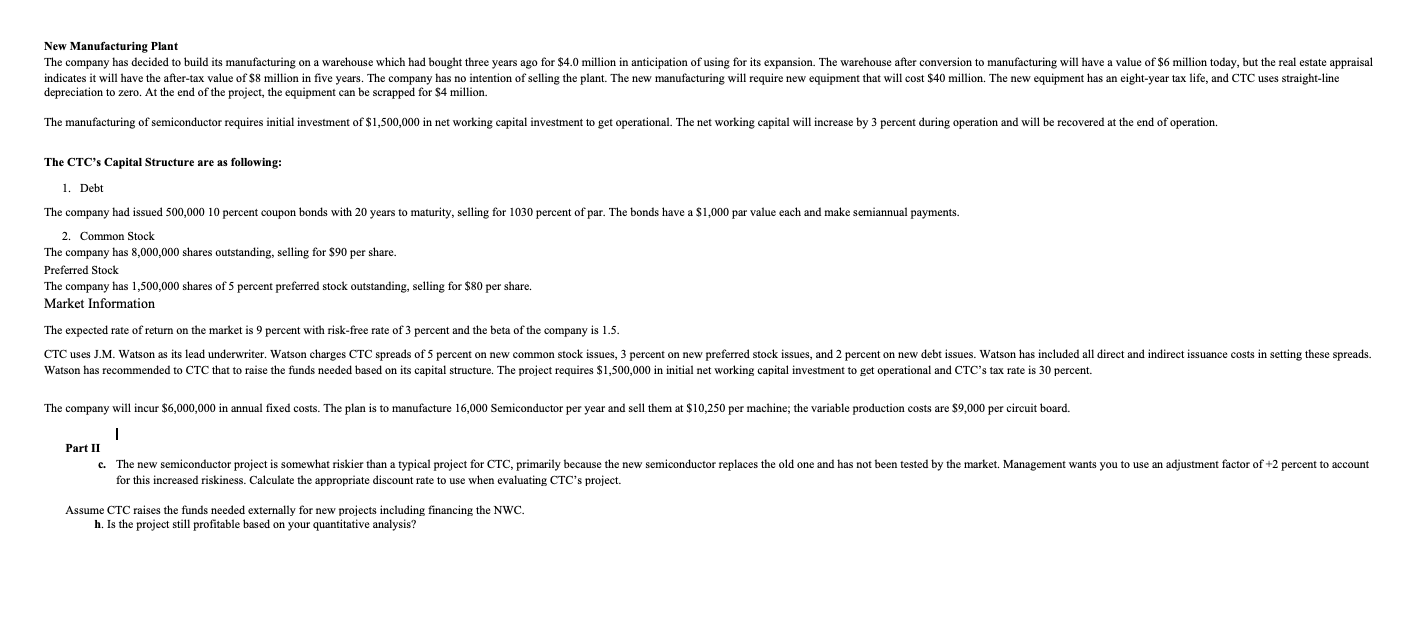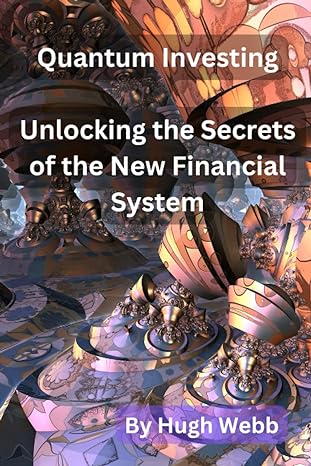
New Manufacturing Plant The company has decided to build its manufacturing on a warehouse which had bought three years ago for $4.0 million in anticipation of using for its expansion. The warehouse after conversion to manufacturing will have a value of $6 million today, but the real estate appraisal indicates it will have the after-tax value of $8 million in five years. The company has no intention of selling the plant. The new manufacturing will require new equipment that will cost $40 million. The new equipment has an eight-year tax life, and CTC uses straight-line depreciation to zero. At the end of the project, the equipment can be scrapped for $4 million. The manufacturing of semiconductor requires initial investment of $1,500,000 in net working capital investment to get operational. The net working capital will increase by 3 percent during operation and will be recovered at the end of operation. The CTC's Capital Structure are as following: 1. Debt The company had issued 500,000 10 percent coupon bonds with 20 years to maturity, selling for 1030 percent of par. The bonds have a $1,000 par value each and make semiannual payments. 2. Common Stock The company has 8,000,000 shares outstanding, selling for $90 per share. Preferred Stock The company has 1,500,000 shares of 5 percent preferred stock outstanding, selling for $80 per share. Market Information The expected rate of return on the market is 9 percent with risk-free rate of 3 percent and the beta of the company is 1.5. CTC uses J.M. Watson as its lead underwriter. Watson charges CTC spreads of 5 percent on new common stock issues, 3 percent on new preferred stock issues, and 2 percent on new debt issues. Watson has included all direct and indirect issuance costs in setting these spreads. Watson has recommended to CTC that to raise the funds needed based on its capital structure. The project requires $1,500,000 in initial net working capital investment to get operational and CTC's tax rate is 30 percent. The company will incur $6,000,000 in annual fixed costs. The plan is to manufacture 16,000 Semiconductor per year and sell them at $10,250 per machine; the variable production costs are $9,000 per circuit board. I Part II c. The new semiconductor project is somewhat riskier than a typical project for CTC, primarily because the new semiconductor replaces the old one and has not been tested by the market. Management wants you to use an adjustment factor of +2 percent for this increased riskiness. Calculate the appropriate discount rate to use when evaluating CTC's project. account Assume CTC raises the funds needed externally for new projects including financing the NWC. h. Is the project still profitable based on your quantitative analysis? New Manufacturing Plant The company has decided to build its manufacturing on a warehouse which had bought three years ago for $4.0 million in anticipation of using for its expansion. The warehouse after conversion to manufacturing will have a value of $6 million today, but the real estate appraisal indicates it will have the after-tax value of $8 million in five years. The company has no intention of selling the plant. The new manufacturing will require new equipment that will cost $40 million. The new equipment has an eight-year tax life, and CTC uses straight-line depreciation to zero. At the end of the project, the equipment can be scrapped for $4 million. The manufacturing of semiconductor requires initial investment of $1,500,000 in net working capital investment to get operational. The net working capital will increase by 3 percent during operation and will be recovered at the end of operation. The CTC's Capital Structure are as following: 1. Debt The company had issued 500,000 10 percent coupon bonds with 20 years to maturity, selling for 1030 percent of par. The bonds have a $1,000 par value each and make semiannual payments. 2. Common Stock The company has 8,000,000 shares outstanding, selling for $90 per share. Preferred Stock The company has 1,500,000 shares of 5 percent preferred stock outstanding, selling for $80 per share. Market Information The expected rate of return on the market is 9 percent with risk-free rate of 3 percent and the beta of the company is 1.5. CTC uses J.M. Watson as its lead underwriter. Watson charges CTC spreads of 5 percent on new common stock issues, 3 percent on new preferred stock issues, and 2 percent on new debt issues. Watson has included all direct and indirect issuance costs in setting these spreads. Watson has recommended to CTC that to raise the funds needed based on its capital structure. The project requires $1,500,000 in initial net working capital investment to get operational and CTC's tax rate is 30 percent. The company will incur $6,000,000 in annual fixed costs. The plan is to manufacture 16,000 Semiconductor per year and sell them at $10,250 per machine; the variable production costs are $9,000 per circuit board. I Part II c. The new semiconductor project is somewhat riskier than a typical project for CTC, primarily because the new semiconductor replaces the old one and has not been tested by the market. Management wants you to use an adjustment factor of +2 percent for this increased riskiness. Calculate the appropriate discount rate to use when evaluating CTC's project. account Assume CTC raises the funds needed externally for new projects including financing the NWC. h. Is the project still profitable based on your quantitative analysis







